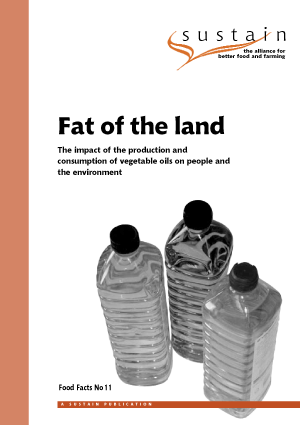Fat of the Land (Food Facts No. 11)
The impact of the production and consumption of vegetable oils on people and the environment (2000)
 There is growing concern about the environment and farming practices, and how our food production and distribution systems may be contributing to problems such as transport pollution, global warming, ill health and loss of wildlife. The Food Facts series of reports provides information about the negative and positive effects of food production and consumption on our environment and society.
There is growing concern about the environment and farming practices, and how our food production and distribution systems may be contributing to problems such as transport pollution, global warming, ill health and loss of wildlife. The Food Facts series of reports provides information about the negative and positive effects of food production and consumption on our environment and society.
With so many vegetable oils to choose from, it is important to know where each oil comes from, its impact on the environment, its nutritional properties and whether it is worth paying the high price demanded for many oils.
This report has found an industry which does little to protect the environment or consumer health and in many cases has led a campaign of misinformation. Key findings are that:
- Over 70% of all oils and fats consumed in the world are derived from vegetable crops.
- The largest source of vegetable oil is soya. Other main sources include oil palm, oilseed rape, sunflowers, groundnuts and cottonseed.
- Rapeseed is mainly grown as a winter crop in the UK which has had a detrimental impact on the environment when compared to spring grown crops. GM rape is now being grown as trials in the UK and already makes up 62% of oilseed rape production in Canada.
- Oil palm production was partly responsible for the large scale fires in south east Asia in 1997 and 1998. Oil palm is planted in rainforest areas which have recently been cleared and has been partly responsible for the loss of biodiversity in many tropical areas.
- Olive oil, grown mainly in the Mediterranean region has caused large scale soil erosion, mainly due to poor management and over-intensification of olive groves in an and environment.
- Olive oil farmers receive large subsidies to produce olive oil and a large proportion of the EC budget on promotional activities has been spent on showing the supposed health benefits of olive oil. Despite these subsidies the price of olive oil is very high and there are few health benefits when compared to other vegetable oils.
- There are great disparities between rich and poor countries in the amount of oils and fats consumed. For example, the average north American consumes two and half times the amount of vegetable fat as the average African. The types of fats consumed in Africa were more likely to contain high levels of saturated fatty acids, such as palm oil.
- Many of the oils and fats consumed today in the UK are found in processed foods, and account for much of our consumption of saturated fats. Oils are often hydrogenated for processing, effectively converting them into saturated fats. Saturated fats cause the build up of cholesterol in the cardiovascular system leading to high blood pressure and ultimately heart attacks and strokes. Fat consumption has also been linked to cancer. It is generally recognised that people in high-income countries consume too much fat (particularly saturated fatty acids) but do not eat enough unsaturated omega-3 fatty acids, found in some oils and fish.
- The European Union protects both its oilseed (sunflower, rapeseed and soya) and olive oil farmers with large subsidies which provide incomes above those provided at world market price. With the liberalisation of world trade and a predicted fall in vegetable oil prices, these subsidies will become more expensive to maintain.
Published Saturday 1 November 2003
Food Facts: A series of short reports on over a dozen different products, shows how people's shopping choices - as well as government policy - can protect the environment, enhance social justice and improve health.
